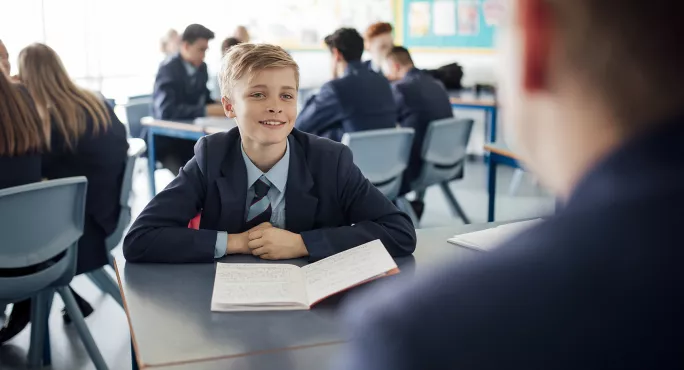
GCSEs: Only a quarter of students had recommended NTP support

Just a quarter of Year 11 students received one-to-one or small group tutoring to help them recover lost learning and prepare for GCSEs during the second year of the pandemic, results of a major study shared with Tes have shown.
Over a third of students (34 per cent) reported feeling that teachers were biased against certain groups in their teacher assessments, which were used to award grades after formal exams were cancelled due to the pandemic, with students from ethnic-minority and disadvantaged backgrounds most likely to feel this way.
The findings come from the Attainment and Assessment briefing from the Covid Social Mobility and Opportunities (Cosmo) study, shared exclusively with Tes.
A representative sample of young people in England who were in Year 11 in the 2020-21 academic year were invited to take part in the survey.
Students sitting their exams in the summer of 2021 were awarded teacher-assessed grades (TAGs) after exams were cancelled for the second year running due to Covid.
The researchers warned that the promising effects of the National Tutoring Programme (NTP) were “unlikely to have made a big difference to learning lost at the cohort level” due to the low take-up.
The Education Endowment Foundation, which ran the NTP for the first year after it was launched in 2020-21, said that ”evidence shows that small group tuition is effective and, as a rule of thumb, the smaller the group, the better”.
- GCSEs: Soaring food prices ‘likely’ to hit grades
- NTP: DfE to fund half of catch-up tutoring costs next year
- Funding: Scrap catch-up subsidy clause or cash will go ‘unspent’, Gibb warned
Then prime minister Boris Johnson stressed the importance of the NTP’s focus on small group tuition in Parliament in January last year, singling out the small groups as a sign of the government’s commitment to catch up.
However, the government has since relaxed the rules, telling schools working with tuition partners that they could “use their discretion” when determining group sizes, with a cap of up to six students allowed in some cases.
The Cosmo study - led by the University College London’s Centre for Education Policy and Equalising Opportunities, the UCL Centre for Longitudinal Studies and the Sutton Trust - questioned 12,828 students aged 16 and 17 (and 9,330 of their parents) between October 2021 and April 2022.
It also revealed that students from independent schools were much more likely to think they had done better than expected than those in state schools.
More than four in 10 (43 per cent) of students from independent schools reported having done better than expected compared to just a third (34 per cent) for those in state grammars, and less than a third (29 per cent) in state comprehensives.
The study also showed that students from ethnic-minority backgrounds were more likely to report perceived teacher bias over the awarding of TAGs, with 37 per cent of black students and 43 per cent of Asian students reporting perceptions of bias in teacher assessments.
Meanwhile, more than half of students (57 per cent) surveyed felt there were too many assessments carried out by teachers during the TAG process, while almost eight in 10 (78 per cent) reported too much grading uncertainty.
However, just a third of students said that they would have preferred to have taken normal exams.
Carl Cullinane, director of research and policy at the Sutton Trust, said it would be important for universities and employers to take into account the unequal impact of pandemic disruption on students entering universities or the workplace.
Earlier this week, the Department for Education announced that it will fund half of the tutoring costs next year under the NTP, rather than the planned 25 per cent, after pressure from union leaders and evidence showing that schools facing higher subsidy costs were leading to them being unable to afford to offer catch-up tutoring.
Mr Cullinane said it was good to see the government had “revisited its plan to cut subsidy”, but the government needed to be “more ambitious and make this a long-term part of national efforts to level the playing field between the most and least disadvantaged pupils”.
A DfE spokesperson said: “Our NTP is helping those pupils most in need of support and has had over three million courses started to date.
“We are also supporting the most vulnerable pupils through pupil premium funding, which is increasing to almost £2.9 billion in 2023-24 - the highest cash terms rate since this funding began.”
You need a Tes subscription to read this article
Subscribe now to read this article and get other subscriber-only content:
- Unlimited access to all Tes magazine content
- Exclusive subscriber-only stories
- Award-winning email newsletters
- Unlimited access to all Tes magazine content
- Exclusive subscriber-only stories
- Award-winning email newsletters
You need a subscription to read this article
Subscribe now to read this article and get other subscriber-only content, including:
- Unlimited access to all Tes magazine content
- Exclusive subscriber-only stories
- Award-winning email newsletters
- Unlimited access to all Tes magazine content
- Exclusive subscriber-only stories
- Award-winning email newsletters
topics in this article



